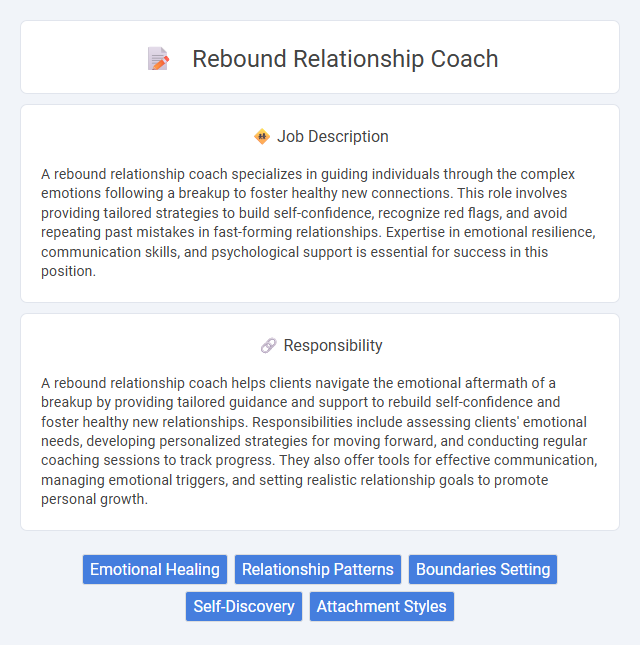
A rebound relationship coach specializes in guiding individuals through the complex emotions following a breakup to foster healthy new connections. This role involves providing tailored strategies to build self-confidence, recognize red flags, and avoid repeating past mistakes in fast-forming relationships. Expertise in emotional resilience, communication skills, and psychological support is essential for success in this position.
Individuals experiencing recent breakups or emotional turmoil are likely suitable candidates for a rebound relationship coach role, as their firsthand understanding of recovery challenges can enhance empathy and guidance. People who demonstrate strong communication skills and emotional resilience may probably thrive in this career, given the need to support clients through complex feelings and transitional phases. Those lacking patience or emotional stability might find the job unsuitable due to the intense emotional demands and the necessity for consistent, compassionate support.
Qualification
A rebound relationship coach typically requires a background in psychology, counseling, or social work, along with specialized certification in relationship coaching or life coaching. Strong skills in emotional intelligence, conflict resolution, and empathetic communication are essential to support clients effectively during transitional periods. Experience in handling breakups and personal development strategies enhances the coach's ability to guide clients toward healthy new relationships.
Responsibility
A rebound relationship coach helps clients navigate the emotional aftermath of a breakup by providing tailored guidance and support to rebuild self-confidence and foster healthy new relationships. Responsibilities include assessing clients' emotional needs, developing personalized strategies for moving forward, and conducting regular coaching sessions to track progress. They also offer tools for effective communication, managing emotional triggers, and setting realistic relationship goals to promote personal growth.
Benefit
Rebound relationship coaches likely provide valuable support by helping clients navigate emotional challenges and avoid repeating past mistakes, increasing the chances of healthier relationship outcomes. Their guidance may improve self-awareness and communication skills, which could enhance clients' confidence in pursuing new partnerships. Clients might experience faster emotional recovery and better decision-making, potentially leading to more fulfilling and stable relationships.
Challenge
Rebound relationship coaches likely face the challenge of helping clients navigate emotional turbulence and trust issues quickly after a breakup. They may need to develop strategies that address insecurities and foster self-confidence while preventing clients from rushing into unhealthy relationships. Effectively managing these complexities probably requires a deep understanding of human psychology and empathetic communication skills.
Career Advancement
A rebound relationship coach specializes in guiding clients through recovery and growth after a breakup, using proven psychological strategies to rebuild confidence and foster healthy new relationships. Career advancement in this field often involves obtaining certifications in relationship counseling, psychology, or life coaching, combined with continuous professional development through workshops and seminars. Building a strong online presence and client portfolio can lead to opportunities in private practice, corporate wellness programs, or media consulting, significantly enhancing earning potential and industry reputation.
Key Terms
Emotional Healing
A rebound relationship coach specializes in guiding clients through emotional healing after a breakup, helping them process feelings of loss, confusion, and insecurity. They employ targeted strategies such as cognitive behavioral techniques and mindfulness to rebuild self-esteem and promote emotional resilience. This role is crucial for fostering healthy relationship patterns and preventing repetitive cycles of codependency.
Relationship Patterns
A rebound relationship coach specializes in identifying and addressing unhealthy relationship patterns that arise immediately after a breakup. By analyzing emotional triggers and attachment styles, they help clients break cycles of emotional dependency and develop healthier relationship habits. Emphasizing self-awareness and emotional resilience, these coaches guide individuals toward lasting, fulfilling partnerships.
Boundaries Setting
A rebound relationship coach specializes in guiding clients through the complexities of new romantic connections following a breakup, with a strong emphasis on boundaries setting. Establishing clear emotional and physical boundaries helps individuals avoid repeating previous relationship patterns and fosters healthy attachment styles. Effective boundary setting during this transitional period promotes self-respect, emotional healing, and long-term relationship success.
Self-Discovery
A rebound relationship coach specializes in guiding individuals through the often confusing emotions following a breakup, emphasizing profound self-discovery to rebuild confidence and emotional resilience. By leveraging personalized strategies and psychological insights, the coach helps clients understand patterns, set healthy boundaries, and identify genuine relationship goals. This focused support fosters personal growth and prepares individuals for healthier future relationships grounded in self-awareness.
Attachment Styles
A rebound relationship coach specializes in guiding individuals through the complexities of post-breakup connections by addressing underlying Attachment Styles such as anxious, avoidant, and secure. These professionals tailor strategies to help clients recognize and modify maladaptive relational patterns rooted in early emotional bonds, fostering healthier interactions. Understanding Attachment Styles is crucial for navigating the emotional challenges of rebound relationships and promoting long-term relationship stability.
 kuljobs.com
kuljobs.com